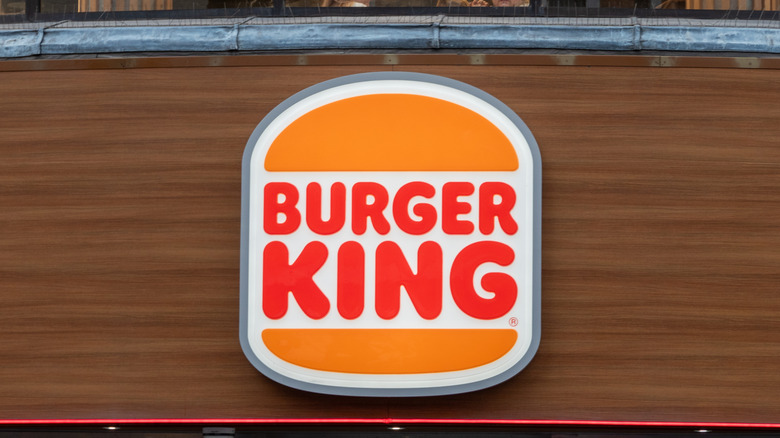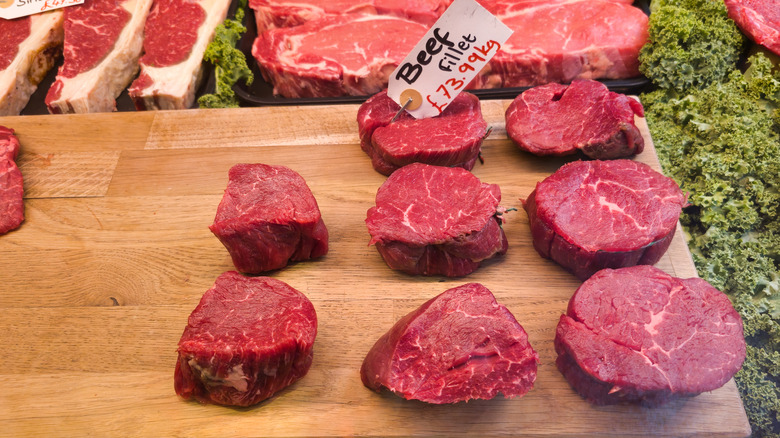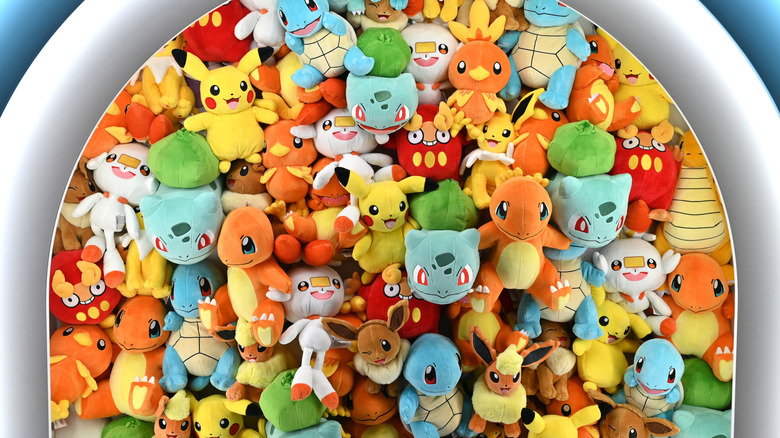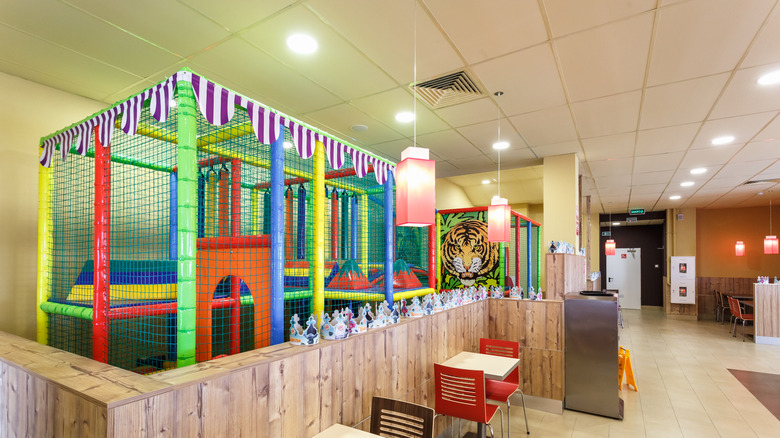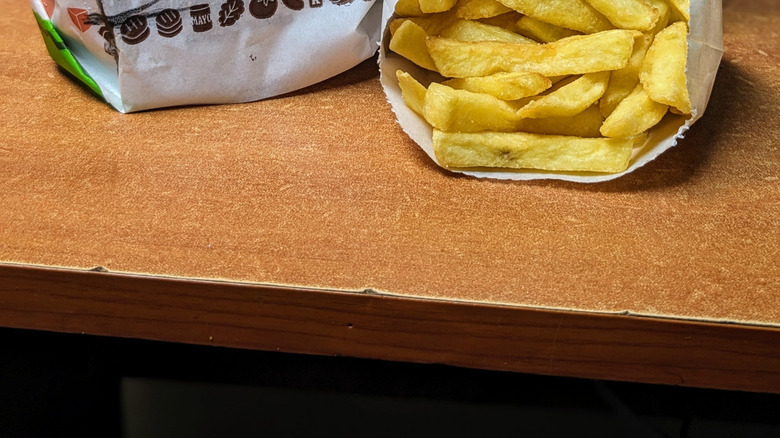Burger King's Biggest Recalls Cost Them A Ton Of Money
Bankruptcy is one the biggest challenges any restaurant can face, as family-friendly TGI Fridays and beloved seafood chain Red Lobster can attest. Another massive challenge? A recall. Recalls happen when a company has to remove a product from the market due to issues like contamination, incorrect labeling, or even general safety concerns. These can happen because of slip-ups in quality control, unexpected trouble with packaging, or even issues with materials from suppliers. Most importantly, almost no one is immune. Prominent food chains like Taco Bell, Subway, and Jack in the Box have all faced major recalls — with even McDonald's facing a significant listeria outbreak in 2024.
These issues can often arise as brands push to improve their offerings or draw in new customers, but sometimes they instead miss the mark. These mishaps can not only prove costly but also serve as valuable lessons on what not to do. One particularly popular fast food brand, Burger King, has faced significant food recalls throughout its history, with many costing them significant amounts of money.
Hudson Foods beef recall, 1997
In 1997, Colorado experienced an outbreak of E. coli O157:H7, traced back to frozen ground beef patties from Hudson Foods, a major supplier for Burger King. This discovery led to a massive recall, in which Burger King had to pull 25 million pounds of beef from the market. The contamination affected1,650 Burger King restaurants. Burger King was also forced to stop selling beef items at 700 of its locations until it could find a new supplier.
This situation put a significant dent in Hudson Foods' business, since Burger King made up 56% of Hudson's $90 million beef sales the year before the recall. While neither Burger King nor Hudson Foods made any financial settlements related to this E. coli outbreak, Hudson Foods did face legal trouble — including federal accusations that it lied about where the contamination started. Though the brand and its executives were indicted, they were never convicted of these charges. However, shortly following this scandal, Hudson Foods was merged into Tyson Foods.
Pokemon toy recall, 1999
In 1999, Burger King ran a $22 million promotion alongside the release of "Pokémon: The First Movie." In this promotion, the company included Poké Ball toys with its kids' meals that opened up to include one of 57 different Pokémon toys. However, the Poké ball containers ended up being a suffocation hazard that led to the deaths of two infants.
The U.S. Consumer Product Safety Commission (CPSC) and Burger King began a voluntary recall of the toys, while Burger Kind paid another $1 million for a campaign designed to warn consumers about the recall. Burger King even incentivized the return of the toy to their locations by offering a reward of free small fries for anyone who brought in both halves of the ball and the accompanying clip. However, the chain faced a class action lawsuit accusing it of delaying the recall despite knowing the toys were dangerous. The families of both suffocation victims ended up winning settlements from the company, although the exact totals were not publicly disclosed.
Playground equipment recall, 2001
Burger King's playgrounds, called Kids Club Play Lands, became popular in the 1990s. However, the playgrounds were found to be a hazard after the 2001 death of a four year old boy, who ended up being caught in netting that featured heavily in the chain's play areas. After the accident, Burger King, in collaboration with the U.S. Consumer Product Safety Commission, recalled the netting from playgrounds nationwide and replaced them with 7-foot-tall 'no climb' nets, designed with much smaller holes to discourage climbing. In addition, it revisited the design and materials of all play structures, opting for nets and other soft, flexible materials that minimized future risks. As these safer nets were being installed, Burger King temporarily closed around 3,200 playgrounds that still had the old netting.
While it is not clear if Burger King paid out a settlement to the family of the boy who died in 2001, a separate incident in 2005 did lead to a $20 million settlement for the family of a child who suffered severe brain injuries after falling from a Burger King play area.
Apple slices recall, 2012 and 2015
Burger King faced two recalls for the same item just three years apart — it's pre-packaged apple slices. In August 2012, the FDA alerted the public that apple slices provided by Missa Bay LLC, which were distributed not just to Burger King but also to McDonald's and various grocery chains, were being recalled due to contamination with Listeria Monocytogenes. A whopping 293,000 cases of sliced apples, and other products containing apples, were ultimately removed from restaurants and store shelves as a result of this recall.
However, in September 2015, Burger King faced yet another recall with its apple slices due to concerns over another listeria contamination. This recall similarly impacted grocery retailers, with apples sold under the Burger King, Snack Fresh, and Appeeling brand names all being affected. It's worth noting that neither the 2012 or 2015 apple recall appear to have caused any significant financial burden for Burger King.
Onion recall, 2024
In October 2024, an E. coli O157: H7 outbreak linked to contaminated onions was traced back to Taylor Farms, which primarily supplied the sliced onions featured in McDonald's Quarter Pounder. Only about 5% of U.S. based Burger King locations received onions from the contaminated facility in question (which was located in Colorado), and the company was quick to remove the implicated onions from their affected restaurants. The outbreak led to 104 reported cases of illness and one death across multiple states. As a response, other fast food chains like Taco Bell, KFC, and Pizza Hut also removed onions from some locations as a precautionary measure.
However, the onion recall didn't hurt Burger King's sales. Instead, the company bounced back in the fourth quarter of 2024 (during the onion recall) compared to its performance in the third quarter of 2024. According to Restaurant Dive, sales had actually dropped by 0.4% in Q3 only to increase by 1.5% in Q4. This uptick might be linked to the fact that the onion recall heavily impacted one of its biggest competitors — McDonald's. After the outbreak, McDonald's suffered significant financial setbacks with customer visits dropping 6.4% across the U.S., and a decline of 24% in Colorado according to Placer.ai data, as reported by CNN. While McDonald's was dealing with reputational damage — and the lack of one of their key menu items — customers looked elsewhere. For many, Burger King — largely unaffected by the recall — served as a safe harbor.
